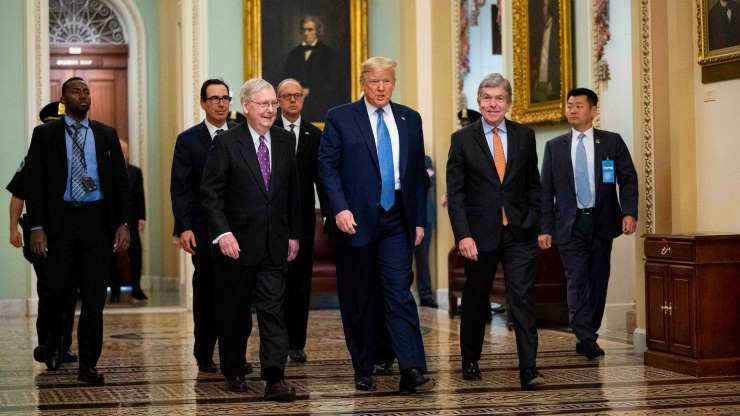
Coronavirus Live Updates/
Trump Goes to Capitol Hill to Discuss Stimulus as Anxiety Rises/
Nursing homes should bar most family and friend visits, the industry says.
Nursing homes and assisted living centers should take unprecedented action to curtail most social visits, and should even take steps to keep some employees away, to slow the spread of the new coronavirus, the industry said on Tuesday.
The recommendation follows an outbreak of the virus in the region around Seattle, where five long-term care facilities have been hit with cases, including a facility in Kirkland, Wash., where 18 residents have died. There have now been more than 800 cases of coronavirus in the United States, including 27 deaths.
“The mortality rate is shocking,” said Mark Parkinson, president and chief executive officer of the American Health Care Association. He said that the death rate might well exceed the 15 percent reported in China for people aged 80 and older who were infected.
The challenge of the virus “is one of the most significant, if not the most significant” issues the industry has ever faced, he said.
Industry officials said they are recommending that nursing homes should allow people to enter only if it is essential.
Staff members, contractors and government officials should be asked, “Do you need to be in-building to operate?” said Dr. David Gifford, the health care association’s chief medical officer.
As for family members, he said, “Our recommendation is they should not be visiting.”
Anyone who does visit, he said, should be screened carefully at reception and anyone who has signs of illness should be turned away.
New York creates a “containment zone” in New Rochelle.
With New Rochelle, a small city just north of New York City in Westchester County, emerging as the center of the state’s outbreak, Gov. Andrew M. Cuomo of New York on Tuesday announced a targeted containment strategy to halt the spread of the virus.
The state’s plan focuses on a “containment area” in New Rochelle with a one-mile radius centered around a synagogue believed to be at the center of the cluster, officials said.
Schools and other large gathering facilities like community centers and houses of worship within the area will be closed for two weeks beginning on Thursday, Mr. Cuomo said. Businesses such as grocery stores and delis would remain open. The state did not plan to close streets or implement travel restrictions, he said.
“You’re not containing people,” he said. “You’re containing facilities.”
The state also planned to deploy the National Guard to the containment area to clean the schools and deliver food to quarantined residents, Mr. Cuomo said.
The cluster in Westchester County first came to the authorities’ attention last week, when a lawyer who lives in New Rochelle and works in Manhattan, Lawrence Garbuz, became the second person in New York to be diagnosed with coronavirus last week.On Tuesday, Gov. Andrew M. Cuomo said that 173 cases had been confirmed statewide. One hundred eight of the cases were in Westchester County, the governor said. Only 14 people with the virus had been hospitalized, the governor said. In New York City, the state had 36 confirmed cases of the virus, Mr. Cuomo said.
***
Investors nervously return to the market after a Wall Street rout.
Some buyers moved back into the markets on Tuesday, a day after the coronavirus and a battle among the world’s biggest oil producers shook the global financial scene and caused the steepest one-day decline in U.S. stock prices in more than a decade.
On Wall Street, the S&P 500 rose more than 3 percent in early trading on Tuesday, but then slipped back, and was up about 1 percent by mid-afternoon. European stocks were down, while Asian markets rose.
Stocks were somewhat buoyed after President Trump on Monday night said he would work with Congress on measures to help the economy amid signs of a worsening outbreak in the United States. But the gains did not come close to making up for the global plunge on Monday.
The S&P 500 fell nearly 8 percent on Monday, its sharpest daily decline since December 2008. In Asia and Europe on Monday, some of the biggest financial exchanges flirted with, or crossed into, bear market territory.
Investors still showed plenty of signs of nervousness on Tuesday. Yields on U.S. government debt rose slightly but remained close to record lows.
The price of oil, which had slumped by a quarter on Monday, rose more than 7 percent on Tuesday, with futures tracking the price of Brent crude trading at about $36.85 a barrel.
Life locked down in Italy: the morning after.
The grand piazzas are empty. The traffic circles are quiet. And people who would normally be sipping their morning espresso in cafes from Milan to Rome are notably absent.
Late Monday, Prime Minister Giuseppe Conte ordered the most severe nationwide limits on travel in Europe, adopting the playbook used by China to contain the virus.
Such draconian measures will undoubtedly prove complicated in a society that prizes individual freedom. But with more than 9,000 cases of infection and nearly 500 deaths, drastic action was needed, Mr. Conte said.
Travel was allowed for work, for health reasons and for trips to buy food and other supplies. But the police can impose penalties if the rules are broken.
The Italian news agency ANSA reported on lines of up to an hour to enter supermarkets in Naples on Tuesday morning, with problems exacerbated by the mandate that people stand about three feet apart.
The Italian national health system geared for an upsurge in critical cases, and the national procurement agency moved to buy equipment for thousands of new intensive-care beds.
Laura Castelli, deputy economy minister, told a radio program that payments on mortgages “for individuals and households” would be suspended throughout Italy. The measure is likely to be part of a fiscal package to bolster the economy that the government is expected to discuss further on Wednesday.